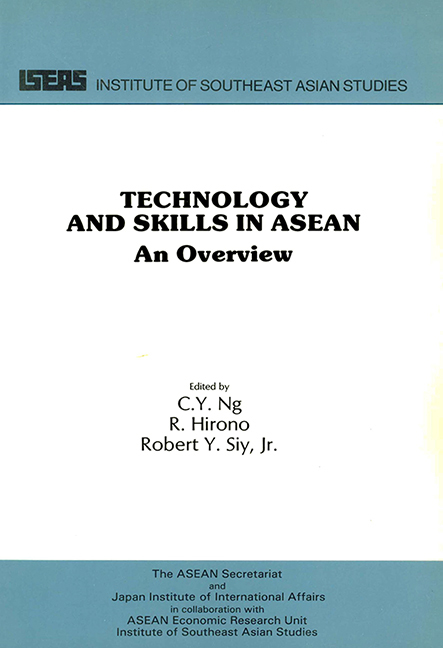Book contents
- Frontmatter
- Contents
- Foreword
- Preface
- PART ONE ASEAN OVERVIEW
- Introduction
- 1 Industrialization in ASEAN
- 2 Technology Transfer, Adaptation and Diffusion in Asean: Problems and Issues
- 3 Science and Technology Policies in Asean
- 4 The Experience From Selected Asean Industries
- 5 Conclusions and Recommendations
- PART TWO SECTION 1: JAPANESE OVERVIEW
- PART TWO SECTION 2: JAPANESE EXPERIENCES IN TECHNOLOGY TRANSFER
- The Editors
4 - The Experience From Selected Asean Industries
from PART ONE - ASEAN OVERVIEW
Published online by Cambridge University Press: 09 November 2017
- Frontmatter
- Contents
- Foreword
- Preface
- PART ONE ASEAN OVERVIEW
- Introduction
- 1 Industrialization in ASEAN
- 2 Technology Transfer, Adaptation and Diffusion in Asean: Problems and Issues
- 3 Science and Technology Policies in Asean
- 4 The Experience From Selected Asean Industries
- 5 Conclusions and Recommendations
- PART TWO SECTION 1: JAPANESE OVERVIEW
- PART TWO SECTION 2: JAPANESE EXPERIENCES IN TECHNOLOGY TRANSFER
- The Editors
Summary
From April 1984 to February 1985, research was conducted in each of the five (excluding Brunei) ASEAN countries. The studies focused on two areas: the transfer of technology from other countries, in particular from Japan, and the technological capabilities and absorptive capacities of ASEAN firms. The research studies attempted to identify barriers to, or bottle-necks in, technology transfer and to formulate measures that the public and private sectors in ASEAN and in Japan can undertake to facilitate the process of technology transfer and skills enhancement.
In the research, technology was defined broadly to include such aspects as product design, production processes, management systems, and even marketing strategies. A transfer of technology was considered to have occurred when the new technology was employed efficiently; when the local work-force was able to use the technology with confidence; when the know-how was successfully disseminated to other local enterprises or plants; or when the local work-force was able to adapt and further improve the imported technology. Consequently, the country research studies aimed at generating information on the experiences of various firms in utilizing foreign technology and on the constraints that were encountered in attempting to transfer or absorb the imported methods.
Background on the Surveyed Industries
The studies chose to focus on two key industries in ASEAN — machinery and electronics. Following the International Standard Industrial Classification (ISIC), the researchers limited the machinery industry to firms producing non-electrical machinery and transport equipment. The electronics industry was limited to firms producing electrical and electronic goods. Both industries were chosen because of their significance in the industrial development strategies of the ASEAN nations. The two industries account for a large segment of industrial investment and employment in ASEAN. The two industries are also heavily dependent on technology from the Western nations and from Japan in particular. Finally, it has been said that these two industries contain those sectors in which the ASEAN nations are gaining comparative advantage while Japan is losing its comparative advantage, and in which perhaps the greatest opportunities for economic co-operation and technical exchange exist between ASEAN and Japan.
- Type
- Chapter
- Information
- Technology and Skills in ASEANAn Overview, pp. 33 - 58Publisher: ISEAS–Yusof Ishak InstitutePrint publication year: 1988

